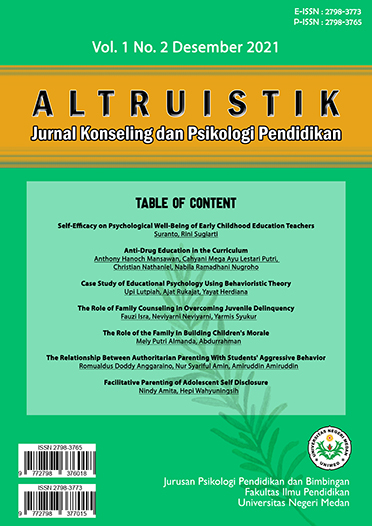Anti-Drug Education in the Curriculum
DOI:
https://doi.org/10.24114/altruistik.v1i2.26227Keywords:
Anti-narcotics Education, Curriculum, Narcotics, PJOK, StudentAbstract
Narcotics have been one of the biggest problems in the world of education. In the last 10 years the numbers of narcotics users amongst student have risen significantly. Data from the National Narcotic Agency shows that at least 20 percent of young adult in Indonesia have consumed narcotic. A variety of solution is made to counter this number; one of them is through the learning process at school. A form of drug education is taught at physical education lesson but only as a minor subject. With the rising number of drug abuser among student, a more intensive solution has to be made. The integration of anti-narcotics education in school curriculum is one way to tackle this problem. School curriculum can make sure that all students received education on narcotic and allows for a more intense learning so that student can better understand the danger of narcotics.References
Amrie, R. I. (2007). Psikologi Kaum Muda Pengguna Narkoba. Salemba Humanika.
Analisa, & Suharningsih. (2017). Implementasi Kurikulum Integrasi Pencegahan Pemberantasan Penyalahgunaan Dan Peredaran Gelap Narkoba (P4GN) Dalam Kegiatan Ekstrakurikuler Pramuka Di SMK Negeri 7 Surabaya. Kajian Moral dan Kewarganegaraan, 5(3), 1112-1126.
Angriani, R. (2016) Upaya Pencegahan Terhadap Penyalahgunaan Narkoba di SMA Negeri 1 Pangkajene Sidendreng Rappang. Skripsi. Universitas Negeri Makassar.
Eleanora, F. N. (2011). Bahaya Penyalahgunaan Narkoba Serta USAha Pencegahan dan Penanggulangannya (suatu Tinjauan Teoritis). Jurnal Hukum Unissula, 25(1), 439-452.
Faisal, Farihah, Hodriani, & Gandamana, A. (2016). Integrasi Pendidikan Anti Narkoba Dalam Pembelajaran Tematik Kurikulum 2013 di Sekolah Dasar. Jurnal Keluarga Sehat Sejahtera, 14(2), 36-45.
Hamdan, H. (2018). Pendidikan Anti Narkoba Dalam Buku Ajar Pai Dan Budi Pakerti Kurikulum 2013 Tingkat Siswa. Skripsi. Universitas Islam Negeri Sunan Kalijaga
How, T. B. (1999). Drug Prevention Education in Schools : the Malaysian experience. Drugs: Education, Prevention and Policy, 6(3), 343-351.
Kementerian Kesehatan Republik Indonesia. (2014). Situasi Dan Analisis Penyalahgunaan Narkoba. Kementerian Kesehatan RI Pusat Data dan informasi.
Machali, I. (2014). Integrasi Pendidikan Anti Narkoba dalam Pendidikan Agama Islam dan Budi Pekerti Kurikulum 2013. Nadwa: Jurnal Pendidikan Islam, 8(2), 229-244.
Mustafa, I. R., Abdillah, M. B., Winata, N. R., Pratama, R., Isnanda, R., Putra, T. D. A., & Sulistyo, W. D. (2019). Edukasi ˜™Gerakan Siswa Anti Narkoba™™(Geswana) Era Desrupsi 4.0 di Smp Wahid Hasyim Malang. Dinamisia: Jurnal Pengabdian Kepada Masyarakat, 3(2), 189-197.
Warlenda, S. V., & Wahyudi, A. (2019). Faktor-faktor yang Berhubungan dengan Penggunaan Narkoba pada Narapidana di Lembaga Pembinaan Khusus Anak Kelas II Pekanbaru. Avicenna: Jurnal Ilmiah, 14(1), 15-24.
Downloads
Published
How to Cite
Issue
Section
License
Copyright (c) 2021 Anthony Hanoch Mansawan, Cahyani Mega Ayu Lestari Putri, Christian Nathaniel, Nabila Ramadhani Nugroho

This work is licensed under a Creative Commons Attribution-ShareAlike 4.0 International License.
Authors published in this journal agree to the following terms:
- The copyright of each article is retained by the author (s).
- The author grants the journal the first publication rights with the work simultaneously licensed under the Creative Commons Attribution License, allowing others to share the work with an acknowledgment of authorship and the initial publication in this journal.
- Authors may enter into separate additional contractual agreements for the non-exclusive distribution of published journal versions of the work (for example, posting them to institutional repositories or publishing them in a book), with acknowledgment of their initial publication in this journal.
- Authors are permitted and encouraged to post their work online (For example in the Institutional Repository or on their website) before and during the submission process, as this can lead to productive exchanges, as well as earlier and larger citations of published work.
- Articles and all related material published are distributed under a Creative Commons Attribution-ShareAlike 4.0 International License.
All writing in this journal is the sole responsibility of the author. Altruistik provides open access to anyone so that the information and findings in these articles are useful for everyone. Altruistik can be accessed and downloaded for free, free of charge, following the creative commons license.
License
ALTRUISTIK : Jurnal Konseling dan Psikologi Pendidikan is licensed under a Creative Commons Attribution-ShareAlike 4.0 International License.










